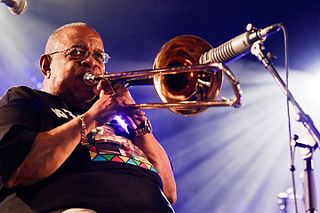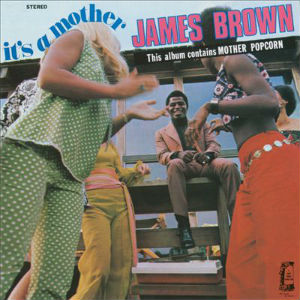
"Funky Drummer" is a single released by James Brown in 1970. Its drum break, improvised by Clyde Stubblefield, is one of the most frequently sampled music recordings.

Big Bad Voodoo Daddy is a contemporary swing revival band from Southern California. Their notable singles include "Go Daddy-O", "You & Me & the Bottle Makes 3 Tonight (Baby)", and "Mr. Pinstripe Suit". The band played at the Super Bowl XXXIII halftime show in 1999.
Phelps "Catfish" Collins was an American musician. A lead guitarist and rhythm guitarist, he is known mostly for his work in the P-Funk collective. Although frequently overshadowed by his younger brother, Bootsy Collins, Catfish played on many important and influential records by James Brown, Parliament, Funkadelic, and Bootsy's Rubber Band.

The J.B.'s was James Brown's band from 1970 through the early 1980s. On records the band was sometimes billed under alternate names such as Fred Wesley and the JBs, The James Brown Soul Train, Maceo and the Macks, A.A.B.B., Fred Wesley and the New JBs, The First Family, and The Last Word. In addition to backing Brown, the J.B.'s played behind Bobby Byrd, Lyn Collins, and other singers associated with the James Brown Revue, and performed and recorded as a self-contained group. In 2015, they were nominated for induction into the Rock and Roll Hall of Fame but failed to be inducted and can be considered for Musical Excellence in the future. They have been eligible since 1995.

Sex Machine is a 1970 double album by James Brown. It showcases the playing of the original J.B.'s lineup featuring Bootsy and Catfish Collins, and includes an 11-minute rendition of the album's title song, different from the original recording of the title song which was released as a two-part single in 1970.

James Lloyd Morrison AM is an Australian jazz musician. Although his main instrument is trumpet, he has also performed on trombone, tuba, euphonium, flugelhorn, saxophone, clarinet, double bass, guitar, and piano. He is a composer, writing jazz charts for ensembles of various sizes and proficiency levels.

The Payback is the 37th studio album by American musician James Brown. The album was released in December 1973, by Polydor Records. It was originally scheduled to become the soundtrack for the blaxploitation film Hell Up in Harlem, but was rejected by the film's producers, who dismissed it as "the same old James Brown stuff." A widely repeated story—including by Brown himself—that director Larry Cohen rejected the music as "not funky enough" is denied by Cohen. On the DVD commentary track for Black Caesar, Cohen states that executives at American International Pictures were already unhappy with Brown for delivering songs much longer than expected on Black Caesar and Slaughter's Big Rip-Off and opted for a deal with Motown Records instead. Cohen said the absence of Brown's music from Harlem still "breaks [his] heart."
"Soul Power" is a song by James Brown. Brown recorded it with the original J.B.'s and it was released as a three-part single in 1971. Like "Get Up Sex Machine" and other hits from this period it features backing vocals by Bobby Byrd. It charted #3 R&B and #29 Pop.
David Matthews, is an American keyboardist, pianist, and music arranger.

"Mother Popcorn (You Got to Have a Mother for Me)" is a song recorded by James Brown and released as a two-part single in 1969. A #1 R&B and #11 Pop hit, it was the highest-charting of a series of recordings inspired by the popular dance the Popcorn which Brown made that year, including "The Popcorn", "Lowdown Popcorn", and "Let a Man Come In and Do the Popcorn". The "mother" of the song's title was, in the words of biographer RJ Smith, "[Brown's] honorific for a big butt".

"Super Bad", originally titled Call Me Super Bad, is a 1970 song by James Brown. Originally released as a three-part single, it went to #1 on the R&B chart and number 13 on the Billboard Hot 100. The song's lyrics include the refrain "I've got soul and I'm super bad." The positive use of the word "bad" is an example of linguistic reappropriation, which Brown had done before in "Say It Loud - I'm Black and I'm Proud".

Love, Power, Peace: Live at the Olympia, Paris, 1971 is a live album by James Brown. It is the only recording that documents one of his live performances with the original J.B.'s lineup featuring Bootsy and Catfish Collins. Love, Power, Peace was originally intended for a 1972 release as a vinyl triple album, but was cancelled after the key members of the original J.B.'s left Brown to join Parliament-Funkadelic. The album was finally released for the first time in 1992, edited down for a single compact disc; the full show, using Brown's original mixdown was later released in July 2014 on Sundazed Records.
"Talkin' Loud and Sayin' Nothing" is a funk song written by James Brown and Bobby Byrd. Recorded in 1970 by Brown and the original J.B.'s with Byrd on backing vocals and updated with a new melody, it was twice released as a two-part single in 1972. It also appeared on the album There It Is.

There It Is is the 33rd studio album by American musician James Brown. His second release for Polydor Records, it contained five of his early-1970s hits. The album was released on June 9, 1972. It reached #10 on the Billboard R&B charts and #60 on the Billboard 200.
"King Heroin" is an anti-drug song by James Brown, David Matthews, Manny Rosen and Charles Bobbit. Brown recorded this poem set to music at a studio in New York with session musicians in January 1972 and released it as a single in March. It was his fifth single for Polydor Records and reached number six on the U.S. Hot Soul Singles chart and number 40 on the Billboard Hot 100 in the spring. The song was included on Brown's 1972 album There It Is.

Hot Pants is the 32nd studio album by American musician James Brown. The album was released in August 1971, by Polydor Records.

Out of Sight is the ninth studio album by American musician James Brown. The album was released in September 1964, by Smash Records.

I Got the Feelin' is the nineteenth studio album by American musician James Brown. The album was released in April 1968, by King Records.

It's a Mother is the 26th full-length studio album by American musician James Brown. The album was released in August 1969, by King Records.

It's a New Day – Let a Man Come In is the 29th studio album by American musician James Brown. The album was released in June 1970, by King Records.















